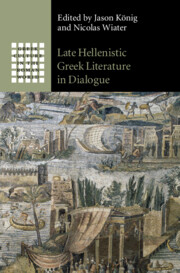Book contents
- Late Hellenistic Greek Literature in Dialogue
- Greek Culture in the Roman World
- Late Hellenistic Greek Literature in Dialogue
- Copyright page
- Contents
- Figure
- Contributors
- Preface
- Abbreviations
- Introduction
- Chapter 1 The Empire Becomes a Body
- Chapter 2 Pyrenaean Mountains and Deep-Valleyed Alps
- Chapter 3 Sailing the Sea, Sailing an Image
- Chapter 4 Ecocritical Readings in Late Hellenistic Literature
- Chapter 5 Civic and Counter-Civic Cosmopolitanism
- Chapter 6 The Wrath of the Sibyl
- Chapter 7 Imagining Belonging
- Chapter 8 Philosophical Self-Definition in Strabo’s Geography
- Chapter 9 Narrating ‘the Swarm of Possibilities’
- Chapter 10 ‘Asianist’ Style in Hellenistic Oratory and Philostratus’ Lives of the Sophists
- Chapter 11 Greek Reading Lists from Dionysius to Dio
- Chapter 12 Envoi
- References
- Index Locorum
- General Index
Chapter 3 - Sailing the Sea, Sailing an Image
Periplus and Mediality in Diodorus’ Bibliotheke and Philostratus’ Imagines
Published online by Cambridge University Press: 21 April 2022
- Late Hellenistic Greek Literature in Dialogue
- Greek Culture in the Roman World
- Late Hellenistic Greek Literature in Dialogue
- Copyright page
- Contents
- Figure
- Contributors
- Preface
- Abbreviations
- Introduction
- Chapter 1 The Empire Becomes a Body
- Chapter 2 Pyrenaean Mountains and Deep-Valleyed Alps
- Chapter 3 Sailing the Sea, Sailing an Image
- Chapter 4 Ecocritical Readings in Late Hellenistic Literature
- Chapter 5 Civic and Counter-Civic Cosmopolitanism
- Chapter 6 The Wrath of the Sibyl
- Chapter 7 Imagining Belonging
- Chapter 8 Philosophical Self-Definition in Strabo’s Geography
- Chapter 9 Narrating ‘the Swarm of Possibilities’
- Chapter 10 ‘Asianist’ Style in Hellenistic Oratory and Philostratus’ Lives of the Sophists
- Chapter 11 Greek Reading Lists from Dionysius to Dio
- Chapter 12 Envoi
- References
- Index Locorum
- General Index
Summary
This chapter takes up the volume’s key notion of ‘dialogue’ by comparing – and thus bringing into dialogue – two periploi from the late Hellenistic and the imperial period, the description of the Red Sea in Diodorus’ Bibliotheke 3.38–48 and the island ecphrasis 2.17 in Philostratus’ Imagines. To the volume’s larger themes, the chapter adds the aspects of mediality and reader response. It shows how both texts employ a fairly similar ecphrastic technique characterised by contextualisation, historicisation and narrativisation, in order to afford their readers quite different experiences. The key element is their divergent strategies of mediality: the Bibliotheke is characterised by a marked ‘bookishness’, whereas the Imagines creates a feigned orality. Both strategies have their place in contemporary discourses and contexts. The Bibliotheke situates itself in the late Hellenistic debate on writing and reading history, and particularly in the discourse on the pleasures of reading historiographical texts, while the Imagines is part of a broader trend of enriching texts with structures and elements of oral communication in the imperial period.
Keywords
- Type
- Chapter
- Information
- Late Hellenistic Greek Literature in Dialogue , pp. 94 - 118Publisher: Cambridge University PressPrint publication year: 2022

